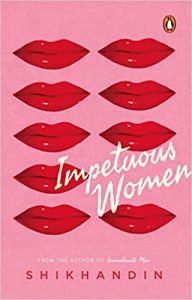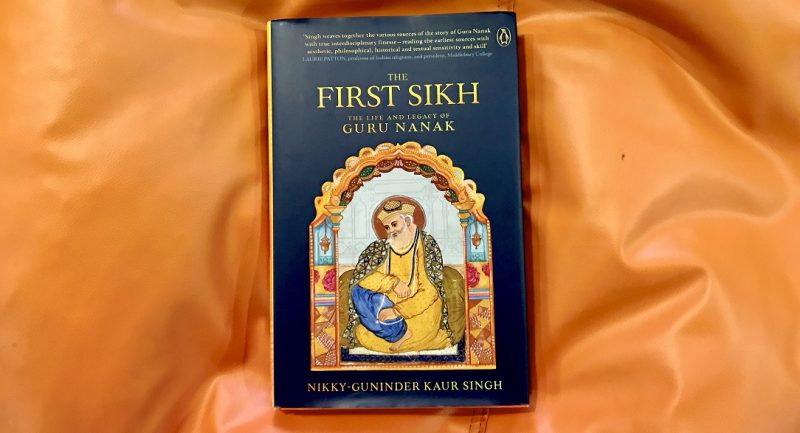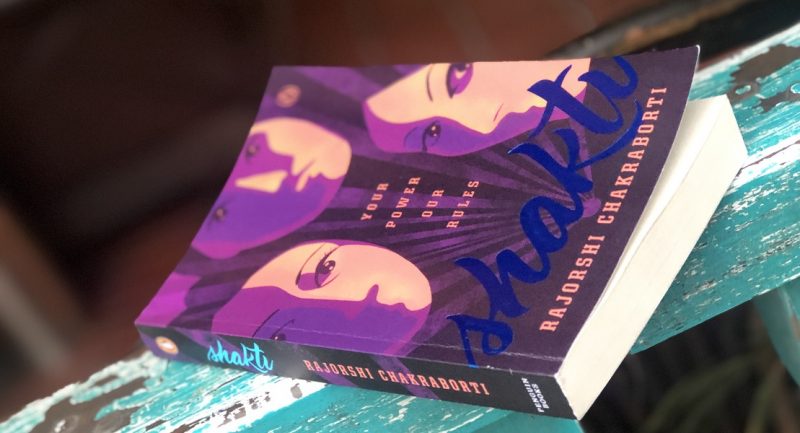
Impetuous Women is about women who step across the Lakshman Rekha, whose transgressions fly in the face of the establishment, the patriarchy, often their own families and loved ones. From two housewives who play a potentially lethal game of keeping up to an expert baker who serves revenge with chocolate sprinkles on top; from a stern hostel warden who examines her relationship with the teenagers she must surveil to a grouchy widow shuts out the world; from a couple madly in love and desperate for a bit of privacy to a tender bond between a husband and wife, these stories create an unforgettable portrait of modern-day India and the experiential realities of being impetuous, of being women.
Here’s an excerpt from the book, Impetuous Women:
I could have moved at that very instant, if I wanted to. I’m a verb after all. But I decided to wait for the right moment. Having been inert for so long, I wanted to savour it. I mean really savour it. So, here I am, narrating the events of the last poetry meeting She-poet ever attended. If I had fingers, I’d rub them in glee! Someone had dropped me during a meeting. Thereafter, unnoticed, I slipped and slid around the table at the centre of the grey conference room, until I finally found a crack in the wood. I remained there, half-buried by a sticky blanket of grey-black erased words, each wrapped tightly in its casing of rubber. I was, for once, watching things unfold around me instead of being in the thick of it. The conference room was inside a squat grey building, which was a cultural centre and library.
There was also an auditorium. The other rooms were full of books and magazines, and soft piped music. Bulletins about cultural activities and happenings in the city were tacked on to felt- covered notice boards in the main hall. Everything inside was grey. The walls were grey. The tables were grey. The chairs were tubular steel with grey foam seats. Even the floor was a greasy grey colour. The conference room had a glossy calendar with a blood red arty print. It was the only bright thing in the room. But it was so arty that it failed to make things cheery.
It is a funny thing. I must have been in that room dozens of times, before my involuntary and sudden
imprisonment within the table, but I had never bothered to look around properly. I had never truly seen the room and its inhabitants. I had never breathed in its atmosphere, so to speak. But once I was bundled up in the crack, I began to observe people closely. Perhaps that is why I was able to understand her the way others in the grey room never would.
She-poet was one among the two-dozen odd poets who gathered in the grey room every fortnight to read
the poems they had written according to a theme chosen in the previous meeting. They assembled at six on the dot in the evening, which was close to dinner time for some of them. I watched them squirm when their stomachs grumbled, and cough to cover up for the sound. The others ignored these un-poetic sounds, and continued with the reading, discussing the merits and demerits of the poems, in soft cultured voices, careful not to irk one another, at least not too much. They reminded me of student ballet dancers doing pirouettes in front of a distinguished surprise-visitor at school.
Each poet brought a sheaf of poem-bearing papers. These were distributed to the members present, and extras were put away on one side of the table for latecomers. Some were habitually late. She-poet was one of them. She was late not because she was tardy by nature, but because she hated the city. The language was strange to her, even though they were all from the same country, and the locals treated her as if she was an unwanted foreigner. You could tell by the way she blundered in that she had not come out of her house until it was nearly time for the poetry reading to begin. She was relatively, but only relatively, new to the city. She had lived in a cleaner, quieter place before, another country. She was used to wide expanses of greenery between her and other people. Some water had flowed under the bridge since, so now the ‘being used to’ bit was more of a mind thing than what being used to really meant.
Nevertheless, She-poet remained faithfully wistful about her past expatriate status.

She had spent many years away, and after her return, felt overwhelmed by the blatant consumerism that had mushroomed all over her homeland. The country was now dirtier and more chaotic. She could not bear the sloppiness, the lack of civic sense in her fellow countrymen. It seemed to her that the new-found wealth had taught them nothing good; if anything, the sudden money was making everyone behave worse than ever.
She-poet found it difficult to come to terms with those who were less impressed by foreign things, and had travelled to more places in the world than she, without ever having been an expatriate. She was dismayed too, by the poverty on the pavements outside glittering hotels and malls, festering like the weeping sores of lepers. She-poet had many complaints. And though she took care not to voice them openly, her secret privations remained unresolved. And unknown to her, she was observed by others with pursed lips. ‘I remember a land that was poor but genteel,’ she once told the poets, after they had reacted blandly to one of her sugary patriotic poems.
A professor of English, sporting a French-cut beard and a thick provincial accent, held up the paper which contained her poem and said, ‘So, according to you, that is the patrimony we deserve after being colonized?’ Before She-poet could think of a suitable retort, a member giggled and said that perhaps she was disappointed because they had progressed so much during the years she had lived abroad. There was a mocking silence as She-poet struggled to reply. The words were half-formed inside her head, but her tongue was too slow to lob them. A silver-haired lady with spectacles so thick that they looked like glass blinkers, and who was the de facto convener of the meetings, looked around owlishly for two or three seconds before reciting an absentee member’s poem loudly. She-poet lost her chance, and inwardly fumed for the rest of the session.
Another time, another professor-poet, who, despite having a doctorate in English and being the principal
of a suburban college, could barely write grammatically correct English, annoyed her so much that she didn’t attend many sessions after that. He called himself a poet, wrote poetry and got it published. It was another matter that the books were shabbily printed by an obscure vanity press. Some gossiped that it was his own publishing house, set up to make money off desperate poets. Barely- literate-professor-poet also enjoyed bashing the erstwhile colonizers in his poetry and lectures. Nothing the ex- rulers did was good. But he had taken pains to get his degrees in English literature, albeit from questionable institutes, and had got his first job as a lecturer of English through much palm-greasing and bum-kissing. He was ingratiatingly nice to the other academics in the group. He seemed desperate to cling to a group of poets writing in the English language. The others knew that he had succeeded over the years because of his ability to hobnob with people with political clout, people who could fund and sanction arts grants and awards.









